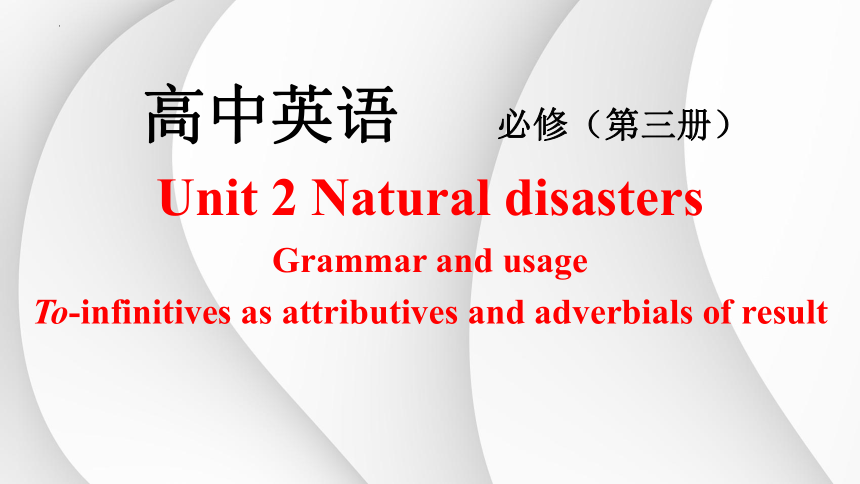(
课件网) Unit 2 Natural disasters Grammar and usage To-infinitives as attributives and adverbials of result 高中英语 必修(第三册) By the end of this section, you will be able to: 1. identify(识别) and categorize(区分) the use of to-infinitives as attributives and adverbials of result; 2. summarize general rules of to-infinitives as attributives and adverbials of result; 3. apply the rules and use to-infinitives to complete or make sentences. Learning aims 1. What kind of natural disasters are connected with a strong storm Lead-in Typhoon, hurricane, tornado … 2. What should people do during a strong storm Stay inside and close and lock all the windows and doors. Listen to the radio to keep informed of what is going on. During a strong storm, we should stay at home and listen to the radio to keep informed of what is going on. Besides a radio, we can have a computer or a smart phone to update the information. However, you can find so much information to read online. Part of it is true. Part of it is false. Sometimes, you collect all the information, only to make yourself confused. What’s the function of the to-infinitives in the following sentences Exploring the rules Read the passage on Page 20, underline the sentences with to-infinitive and fill them in the table according to the different functions. To-infinitives as attributives To-infinitives as adverbials of result I was staying in Atlanta, and that was one of the cities to be hit. That morning, I turned on the TV for some local news, only to hear that a hurricane was on its way. The roads were blocked, so there was nothing for me to do but stay inside. I had enough food and water to last a whole week! … I looked out of the window, only to see huge trees lying across the street and water everywhere! Exploring the rules When the to-infintive is used as an attributive, it is often put (before/after) the noun or pronoun it modifies. When the to-infintive is used as an adverbial of result, it can refer to an (expected/unexpected) result. In this case, we often use only before the to-infinitive. after unexpected Working out the rules Exploring the rules Go through the grammar notes on Pages 98–99. Exploring the rules Applying the rules Match the first half of the sentences below with the correct to-infinitives. B1 (1) e (2) c (3) d (4) b (5) a Applying the rules Complete the diary entry below using to-infinitives. B2 (1) to find books about hurricanes (2) to find he was not in the office (3) to attend (4) to make PPT slides for my project Work in pairs and complete the conversation using to-infinitives. B3 (1) was actually the first to leave (2) to keep us warm (3) wanted to return home as soon as possible (4) to find it completely destroyed (5) advised us to take an active part in the rebuilding Applying the rules Other functions of to-infinitives besides attributives and adverbials of result Subject: Object: Object completement: Pre ... ...

